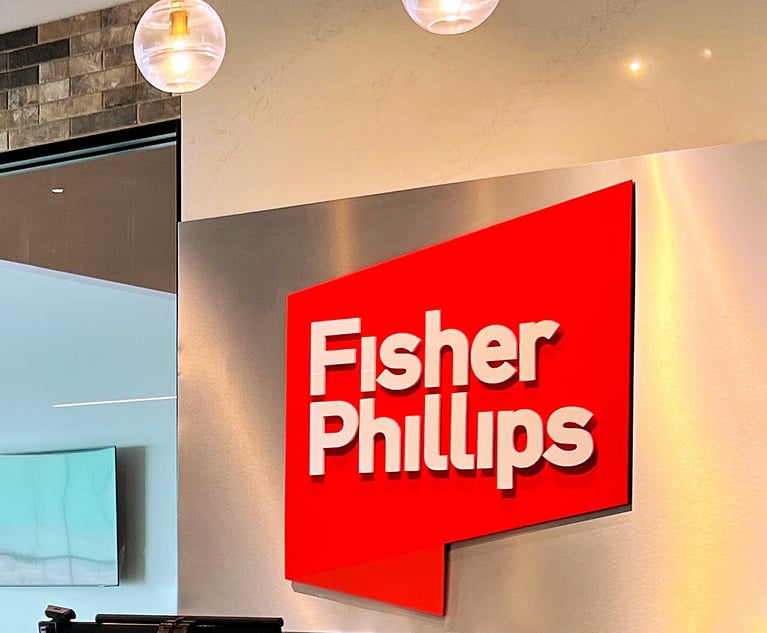S.F. City Attorney Subpoenas Uber, Lyft on Driver Practices
San Francisco's city attorney on Monday stepped up his scrutiny of ride-hailing operations, issuing administrative subpoenas to Lyft Inc. and Uber Technologies Inc. for records on driver practices and the services the companies offer to disabled riders.
June 05, 2017 at 02:24 PM
7 minute read
SACRAMENTO—San Francisco's city attorney on Monday stepped up his scrutiny of ride-hailing operations, issuing administrative subpoenas to Lyft Inc. and Uber Technologies Inc. for records on driver practices and the services the companies offer to disabled riders.
Dennis Herrera also asked the Public Utilities Commission, the agency that oversees ride-hailing businesses in California, for data on how ride-hailing companies affect traffic, cyclist and pedestrian safety, pollution and parking.
The convenience of ride-hailing “evaporates when you're stuck in traffic behind a double-parked Uber or Lyft, or when you can't get a ride because the vehicle isn't accessible to someone with a disability or because the algorithm disfavors the neighborhood where you live,” Herrera said in a prepared statement. “The status quo is not working.”
A Lyft spokeswoman, Chelsea Harrison, said the company was reviewing the subpoena, which was delivered to the company's legal department. Harrison said nearly 30 percent of rides in San Francisco take place in “underserved neighborhoods” and 20 percent begin or end at a public transit station.
“Lyft has always been focused on improving transportation access for people across all cities in which we operate,” Harrison said.
Representatives of Uber and the PUC did not return messages seeking comment Monday.
Although Uber and Lyft have headquarters in San Francisco, city officials have not shied away from challenging the companies' business practices.
Uber has been a particular target. Last year, Uber agreed to pay up to $25 million to settle litigation brought by San Francisco and Los Angeles for making misleading claims about its driver background checks. (Lyft settled the suit in 2014 for $500,000.) Last month, Herrera sued Uber for refusing to provide information showing whether its drivers are complying with San Francisco's business and tax regulations. A hearing is scheduled for later this month in San Francisco Superior Court.
Nearly 45,000 vehicles drive in San Francisco under the Uber and Lyft logos, according to the city attorney's office.
The rise of ride-hailing companies has boosted concerns about congestion in major cities. New York transportation regulators are reportedly looking at that impact.
Ed Reiskin, director of the San Francisco Municipal Transportation Agency, said officials need the subpoenaed data to understand the effects that many drivers are having on the city.
“We are hearing a growing number of complaints from residents, businesses, and our own traffic enforcement staff and Muni operators about the behavior of these drivers and the congestion and pollution caused by the sheer volume of these vehicles on our city's streets,” Reiskin said in a prepared statement.
The Public Utilities Commission does collect data from Uber and Lyft on services they provide, such as how often a disabled rider can connect with an accessible vehicle and whether residents in some neighborhoods can find rides more easily than those living elsewhere. The agency fined Uber $7.6 million and held the company last year in contempt for failing to turn over that data by a PUC-set deadline.
The commission has not provided the public with the companies' information, despite San Francisco officials' “long-standing request that it do so,” Herrera said.
SACRAMENTO—San Francisco's city attorney on Monday stepped up his scrutiny of ride-hailing operations, issuing administrative subpoenas to Lyft Inc. and Uber Technologies Inc. for records on driver practices and the services the companies offer to disabled riders.
Dennis Herrera also asked the Public Utilities Commission, the agency that oversees ride-hailing businesses in California, for data on how ride-hailing companies affect traffic, cyclist and pedestrian safety, pollution and parking.
The convenience of ride-hailing “evaporates when you're stuck in traffic behind a double-parked Uber or Lyft, or when you can't get a ride because the vehicle isn't accessible to someone with a disability or because the algorithm disfavors the neighborhood where you live,” Herrera said in a prepared statement. “The status quo is not working.”
A Lyft spokeswoman, Chelsea Harrison, said the company was reviewing the subpoena, which was delivered to the company's legal department. Harrison said nearly 30 percent of rides in San Francisco take place in “underserved neighborhoods” and 20 percent begin or end at a public transit station.
“Lyft has always been focused on improving transportation access for people across all cities in which we operate,” Harrison said.
Representatives of Uber and the PUC did not return messages seeking comment Monday.
Although Uber and Lyft have headquarters in San Francisco, city officials have not shied away from challenging the companies' business practices.
Uber has been a particular target. Last year, Uber agreed to pay up to $25 million to settle litigation brought by San Francisco and Los Angeles for making misleading claims about its driver background checks. (Lyft settled the suit in 2014 for $500,000.) Last month, Herrera sued Uber for refusing to provide information showing whether its drivers are complying with San Francisco's business and tax regulations. A hearing is scheduled for later this month in San Francisco Superior Court.
Nearly 45,000 vehicles drive in San Francisco under the Uber and Lyft logos, according to the city attorney's office.
The rise of ride-hailing companies has boosted concerns about congestion in major cities.
Ed Reiskin, director of the San Francisco Municipal Transportation Agency, said officials need the subpoenaed data to understand the effects that many drivers are having on the city.
“We are hearing a growing number of complaints from residents, businesses, and our own traffic enforcement staff and Muni operators about the behavior of these drivers and the congestion and pollution caused by the sheer volume of these vehicles on our city's streets,” Reiskin said in a prepared statement.
The Public Utilities Commission does collect data from Uber and Lyft on services they provide, such as how often a disabled rider can connect with an accessible vehicle and whether residents in some neighborhoods can find rides more easily than those living elsewhere. The agency fined Uber $7.6 million and held the company last year in contempt for failing to turn over that data by a PUC-set deadline.
The commission has not provided the public with the companies' information, despite San Francisco officials' “long-standing request that it do so,” Herrera said.
This content has been archived. It is available through our partners, LexisNexis® and Bloomberg Law.
To view this content, please continue to their sites.
Not a Lexis Subscriber?
Subscribe Now
Not a Bloomberg Law Subscriber?
Subscribe Now
NOT FOR REPRINT
© 2025 ALM Global, LLC, All Rights Reserved. Request academic re-use from www.copyright.com. All other uses, submit a request to [email protected]. For more information visit Asset & Logo Licensing.
You Might Like
View All
Lawsuit alleges racial and gender discrimination led to an Air Force contractor's death at California airfield
7 minute read


Trending Stories
- 1Silk Road Founder Ross Ulbricht Has New York Sentence Pardoned by Trump
- 2Settlement Allows Spouses of U.S. Citizens to Reopen Removal Proceedings
- 3CFPB Resolves Flurry of Enforcement Actions in Biden's Final Week
- 4Judge Orders SoCal Edison to Preserve Evidence Relating to Los Angeles Wildfires
- 5Legal Community Luminaries Honored at New York State Bar Association’s Annual Meeting
Who Got The Work
J. Brugh Lower of Gibbons has entered an appearance for industrial equipment supplier Devco Corporation in a pending trademark infringement lawsuit. The suit, accusing the defendant of selling knock-off Graco products, was filed Dec. 18 in New Jersey District Court by Rivkin Radler on behalf of Graco Inc. and Graco Minnesota. The case, assigned to U.S. District Judge Zahid N. Quraishi, is 3:24-cv-11294, Graco Inc. et al v. Devco Corporation.
Who Got The Work
Rebecca Maller-Stein and Kent A. Yalowitz of Arnold & Porter Kaye Scholer have entered their appearances for Hanaco Venture Capital and its executives, Lior Prosor and David Frankel, in a pending securities lawsuit. The action, filed on Dec. 24 in New York Southern District Court by Zell, Aron & Co. on behalf of Goldeneye Advisors, accuses the defendants of negligently and fraudulently managing the plaintiff's $1 million investment. The case, assigned to U.S. District Judge Vernon S. Broderick, is 1:24-cv-09918, Goldeneye Advisors, LLC v. Hanaco Venture Capital, Ltd. et al.
Who Got The Work
Attorneys from A&O Shearman has stepped in as defense counsel for Toronto-Dominion Bank and other defendants in a pending securities class action. The suit, filed Dec. 11 in New York Southern District Court by Bleichmar Fonti & Auld, accuses the defendants of concealing the bank's 'pervasive' deficiencies in regards to its compliance with the Bank Secrecy Act and the quality of its anti-money laundering controls. The case, assigned to U.S. District Judge Arun Subramanian, is 1:24-cv-09445, Gonzalez v. The Toronto-Dominion Bank et al.
Who Got The Work
Crown Castle International, a Pennsylvania company providing shared communications infrastructure, has turned to Luke D. Wolf of Gordon Rees Scully Mansukhani to fend off a pending breach-of-contract lawsuit. The court action, filed Nov. 25 in Michigan Eastern District Court by Hooper Hathaway PC on behalf of The Town Residences LLC, accuses Crown Castle of failing to transfer approximately $30,000 in utility payments from T-Mobile in breach of a roof-top lease and assignment agreement. The case, assigned to U.S. District Judge Susan K. Declercq, is 2:24-cv-13131, The Town Residences LLC v. T-Mobile US, Inc. et al.
Who Got The Work
Wilfred P. Coronato and Daniel M. Schwartz of McCarter & English have stepped in as defense counsel to Electrolux Home Products Inc. in a pending product liability lawsuit. The court action, filed Nov. 26 in New York Eastern District Court by Poulos Lopiccolo PC and Nagel Rice LLP on behalf of David Stern, alleges that the defendant's refrigerators’ drawers and shelving repeatedly break and fall apart within months after purchase. The case, assigned to U.S. District Judge Joan M. Azrack, is 2:24-cv-08204, Stern v. Electrolux Home Products, Inc.
Featured Firms
Law Offices of Gary Martin Hays & Associates, P.C.
(470) 294-1674
Law Offices of Mark E. Salomone
(857) 444-6468
Smith & Hassler
(713) 739-1250






